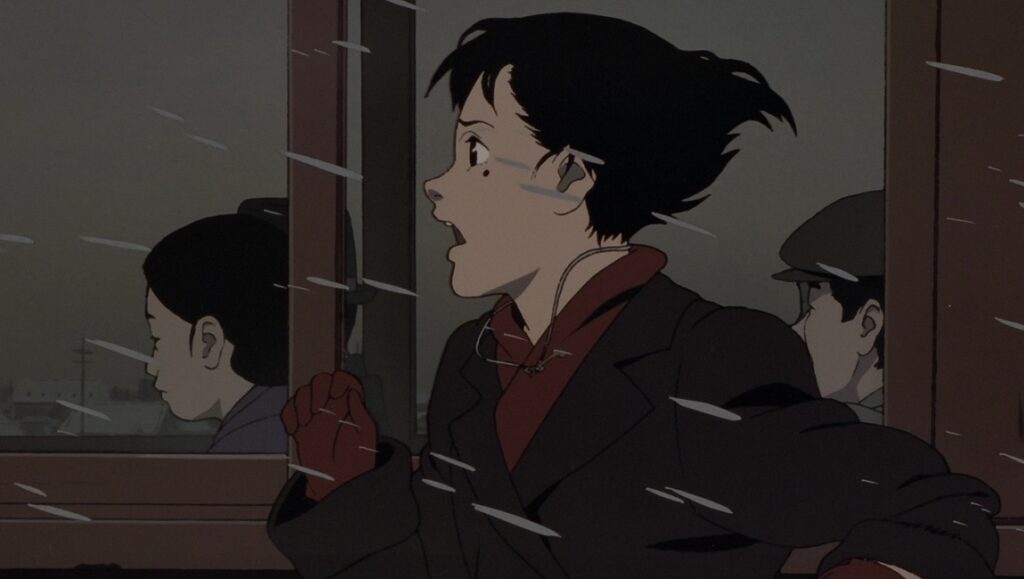Following the success and acclaim of his reality-bending 1997 directorial debut Perfect Blue — a feverish take on the Giallo genre, filtered through a ’90s cyber aesthetic — anime director Satoshi Kon looked to his own country’s (extraordinarily rich) cinematic history when crafting his sophomore film. The idea from which it blossomed was simple: as a reclusive old actress recounts her life story to a television interviewer and his cameraman, the memories of her life and the roles she played begin to gradually bleed together, forming an elaborate emotional metanarrative — a convenient jumping off point for Kon’s explosive visual sensibility and career-long obsession with fiction “invading” the real.
In a way, Millennium Actress exists as the exact inverse to Perfect Blue. While they both prominently blur the boundaries between reality and fiction — as do all of Kon’s major directorial works, even the more grounded Tokyo Godfather (2003), which is seldom acknowledged — Millennium Actress does so in pursuit of something more gentle and conciliatory, with Kon (who passed from pancreatic cancer in 2010, at the age of 46) mining the blurred lines for open-hearted melodrama rather than chilly, hallucinatory horror. The actress, Chiyoko Fujiwara (Miyoko Shôji), reflects on her life after being given a previously lost key by the TV host, Genya Tachibana (Shôzô Iizuka), and Kon traces her reminiscences along the history of Japan’s 20th century cinema as well as its politics.
As the film makes its way through her life/career, the films that are referenced — Akira Kurosawa’s Ran and Throne of Blood, Ishirô Honda’s Godzilla, Yasujirô Ozu’s Tokyo Story — aren’t there for a quick fix of nostalgia or anything resembling “memberberries” (to borrow from fairly snide Internet parlance). They are part of the history and cultural identity of Japan. Chiyoko’s story coalesces with her acting roles, the same way films — and art in general — become woven into the very fabric of our reality through a shared communal experience. As Genya and cameraman Kyôji Ida (Masaya Onosaka) are ushered through the episodes of her life, they become part of her life, her work, her art, her story.
Kon’s usual sense of narrative momentum is in full force as he torpedoes through eras and genres, real life and make-believe. The rubble that Chiyoko’s hometown is at one point reduced to transforms into a kaiju film set, the earth-shattering stomps of the oversized beast in turn melting into the present as earthquakes. The emotional throughline in the midst of all this phantasmagoric spectacle comes in the form of a love story: a young Chiyoko (Fumiko Orikasa) meets an artist and political dissident who is opposed to the Second Sino-Japanese War and helps him elude the authorities by hiding him in the back of the shop her father left her and her mother after he died in the Great Kantô earthquake of 1923. She quickly falls in love with the man, but before any kind of relationship can develop and, indeed, before she can even learn his name, the mysterious man is forced to go on the run once again, leaving behind only the key to his suitcase — the key given to her by Genya decades later.
It’s this event that, against her mother’s wishes, pushes her into acting for good, the fateful meeting occurring on the same day Chiyoko was noticed by a director working for a major Japanese movie studio. In hopes of being recognized and sought out by the man, she pursues this career in film, holding out hope that she will one day be reunited with the political dissident. But her pursuit isn’t romantic as much as it is an act of pure faith, and the worlds she inhabits as an actress reflect this heroic faith as well: tiny human beings fighting a gargantuan kaiju, a lovestruck rōnin taking on the shogunate of the Edo period in order to save the woman he has fallen in love with — no matter how hopeless the odds are, every world has its heroes, its incorrigible believers.
Even though the adult Chiyoko (Mami Koyama), portraying a princess, is at one point cursed to “burn forever in the flames of eternal love” by a malevolent spirit, mirroring her own hopeless romantic longing, her absurd refusal to succumb to hopelessness ultimately doesn’t lead her to heartbreak but rather to tranquil acceptance. Even though she’s unaware of his death, she eventually gives up on looking for him on her own accord, having grown in the many years since their meeting. “The part I really loved was chasing him,” she says on her deathbed, her already failing health worsened by a powerful earthquake.
Besides being a love story, Millennium Actress is obviously also a love letter to cinema, but its gorgeous animation transcends the medium’s live-action restraints. Through it, Kon’s characters — as they are wont to do — morph into something bigger than themselves. Unlike Perfect Blue‘s pop star, Mima Kirigoe, these characters inhabit a space where the blurring of realities isn’t ominous or foreboding, but rather a beautiful rift of unlimited potential, one where not even death is the end. The actress, nearing the end of her life, realizes this — or has perhaps known it for a while — and when she finally takes her final breath, reality shifts once more and a younger Chiyoko readies herself for one last act of heroism: taking on the cold, uncaring void of space as she blasts off in a spaceship — hopeful, against all odds.
Part of Kicking the Canon — The Film Canon.
Enjoy our content? Want early access to features, interviews, and more? Support us on Patreon!


Comments are closed.